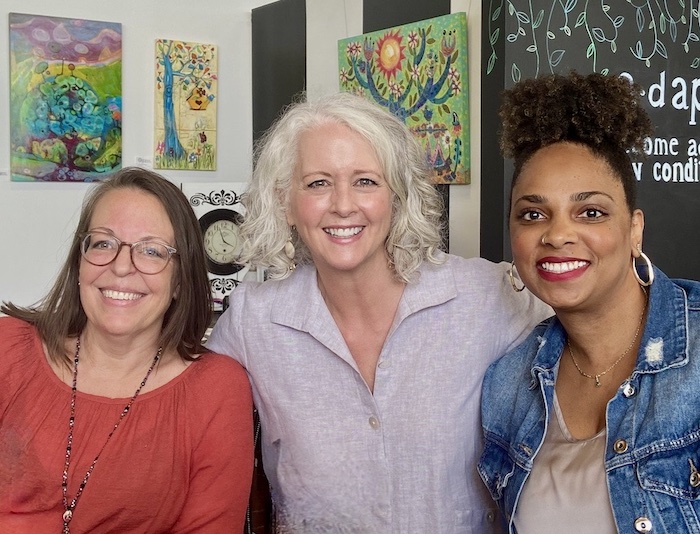In an email, Chris asks:
Does selling one’s artwork on products like note cards, writing journals, calenders, etc. through online companies like CaféPress.com or Zazzle
In other words, can selling reproductions on products like this hurt an artist’s career? or help it?
(I’m defining "serious" art collectors as someone who would buy an original painting from an emerging artist for several hundred dollars to a couple thousand dollars.) diminish, enhance, or have no effect, on the perception serious art collectors have of an artist’s work?
Chris, this is an excellent question and I wish I had an excellent answer. But we just don’t know yet. These resources are too much in their infancy to be able to tell. And the artworld is slow to adapt to changes, such as the commercial enterprises available online. On the other hand . . . visit any museum store and see the works from their collections splattered over mugs, mouse pads, and notebooks.
Artists should always consider their long-range goals before starting any new venture. It’s easy to think creatively. It’s more difficult to pull in the reigns and say “Whoa! That’s going to get me going off path. Maybe I should reconsider and refocus.”
I counsel some artists (again, depending on their goals) to do more of their commercial work under a DBA (”doing business as” name) and create their fine art under their own name. This means two different “lines” and helps distinguish among the two worlds.



12 thoughts on “Will selling products hurt your fine art career?”
I wonder about this all the time. I have to once again play the devil’s advocate and wonder how people will get that name recognition when we are using different names to get the art out there. Doesn’t it seem like we benefit from people seeing the art with our names attached, no matter the setting? With such an onslaught of information in this world, it is unlikely that people necessarily remember WHERE they saw the art/name. What’s important is that they have seen it. I could be wrong, but there are my 2 cents. Thanks for the food for thought, Alyson.
I think it’s good to consider what kind of art career you’re aiming for. If you’re looking for a top notch museum type career selling your own cards at art sales is probably not in your best interest unless they are really top quality. If you’re doing outdoor art shows it’s always nice to have an affordable way for interested clients to take home some reminders of your work. When I had my own shop I sold cards of some of my smaller images but I kept my best images as originals only. From going around to lots of galleries I see all sorts of artist products like cutting boards and glass tiles with images on them. I tend to think those are pretty tacky and I don’t see them in really good galleries (probably for that reason). Every artist is going to have to decide this one for themselves. I know an artist who hands out key chains with tiny repros of his paintings on them everywhere he goes. Does it bring him clients? I don’t know but he feels it gives him exposure. I guess we all have to ask what kind of exposure we really want. sorry this is long….
More than anything, I think it depends on the type and quality of the product. It also depends a bit on how much cross-marketing you can do… If you sell items in a closed marketplace that doesn’t allow you to link to your other online presences, it doesn’t do nearly as much to promote your artwork or name. I find that I sometimes sell art to people who find me because of my custom code business, and vice versa. I sometimes sell tee shirts to people who can’t afford my more expensive art. I sometimes sell art to people who find me as a result of something else I’m doing. The standard advice for artists is to pick something very specific to be known for, and in the old gallery system that was often true, but I think things are changing. In part, it really depends on your story too. My story has been very much about the fact that I work in many different media and in different fields. It’s not so much a jack of all trades story as a story about problem-solving, engineering, impossibility remediation… I apply the same critical thinking skills to art that I do to writing code or marketing or business. The real key to creating work at different price points and in different areas is to be sure that you are handling each of these with the same level of attention and excellence. If you can do that, I think working multiple markets will work out quite well.
This is something I have been curious about for some time now. My husband/artist has received several requests to license artwork of his in scholastic textbooks. Art patrons of ours express their approval and support of those projects. I have spoken with art buyers who have told me to steer clear of what they call “cheapening” the original artwork by placing the image on items such as ball caps, coffee mugs etc. So far all of our licensing agreements have been for scholastic text books, but I am interested in exploring this issue further. http://www.originaloilpaintings.typepad.com
I don’t know whether or not it will hurt my career, but from th beginning I have been clear that I have wanted to make my art accessible and I am delighted to now have some merchandise with my paintings on it! ~ Diane Clancy http://www.dianeclancy.com/blog
Wow! What a great subject to bring up, especially in these times when use of the internet and being able to connect with such a large potential customer base is right at your finger tips, and in the privacy of your own home. I am a late bloomer, but however enthusiastic I may be about truly wanting to get my name known, I so agree with the aforementioned, that you just need to have a understanding with yourself as to what your true goal is. I sell, at this point, only note cards. I hear it all the time “These are pretty enough to frame”. Cool, do that!! Then maybe you or someone else will hopefully buy an original. Then maybe, just maybe you will tell someone, who will tell someone about my art. If you are ok with knowing, and can accept that a gallery owner actually supporting your work is a rare thing, then being able to market your own work is the American dream. I totally support those who can sell their artwork, however it is reproduced. And what a great idea to market your internet sales under a dba. Thank you so much for your site Alyson!! http://www.tonyaangel.com
Hi Alyson, From the number of comments, it’s obvious this question perplexes many artists. As others above have noted, the decision rests to a degree with what the artist is seeking for their art. As you frequently remind your readers, one must have a plan. For most artists, being on products, or more appropriately put, licensing their work, is not going to be detrimental. And, for those who do have concerns about cheapening their carefully groomed museum bound career, which is a lofty, but nevertheless legitimate goal, then using a dba or “nom de brusse” if you will, is an acceptable alternative to leaving good money on the table. There are many more artists who paint under assumed names for licensing companies and poster publishers than most imagine. I have an article being reprised from a contributed blog on Absolute Arts on http://www.emptyeasel.com on Tuesday, Sept. 4. It is titled, “Posterity or Prosperity, Can Artists Have It Both Ways.” It’s still on Absolute Arts at: http://blog.absolutearts.com/blogs/archives/00000169.html. I trust some of your blog subscribers will find it worth the read.
I have notecards that have my name and website on the back. I look at it as another way to get my name out there and possibly sell some work from my website. You never know where these cards will be sent and who may get them! I too have had people tell me they pretty enough to frame, and have done it! That’s ok with me!
Thanks, Barney. I agree with the dba name as an alternative. And I’m sure my readers will get a lot from your article.
Great topic Alyson. I recently started advertising a “art reproduction center” on my free artist directory. I’m getting some heat for it from the purists who claim I ought to only promote “self-representing” artists. Somewhat off topic, but related. However, I don’t view the promotion as a real conflict because it really addresses another audience (folks looking for masterpiece replicas vs. folks looking for local traditional artists for individual / family portraits). Besides, for me, using paid advertisers help s pay for, and offset my costs, in delivering free services provided to the “self-representing” artists. Isn’t that reasonable?
Hello, Now that the opportunities have grown for artists, and time has past since this original post, what is your opinion now of this topic? I’d love to hear your feedback! Thanks!
Tiffany: Great question. I will consider an updated post on the topic. I hope you subscribe to my emails for notification.